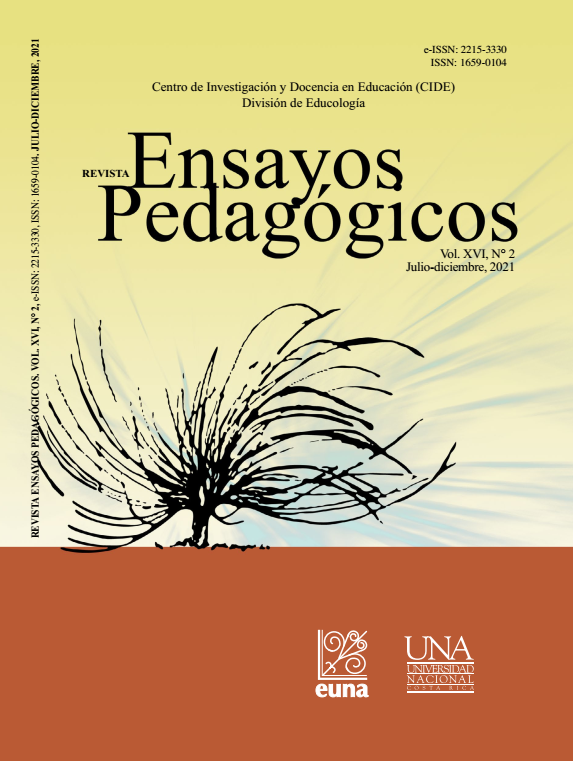The Significance of Teaching English for Specific Purposes in Costa Rica
DOI:
https://doi.org/10.15359/rep.16-2.7Keywords:
English for Specific Purposes, Costa Rica, significance, aim, effectsAbstract
This essay aims at analyzing the significance of the English for Specific Purposes (ESP) approach in Costa Rica. In addition, the authors scrutinized and compared different sources, such as journals, digital books, web pages, and others in order to provide relevant information regarding ESP, for instance, the aim of ESP based on its definition, its types, its objectives, and the effects of the absence of this approach in the learning process and the curriculum of the students as future employees, considering that Costa Rica does not have enough specialists in the area yet. Some programs to teach the target language for different majors need to be redesigned in order to guarantee the students a learning process based on the professional profile that they want to achieve, their needs, and their professional field. Likewise, this paper also explains the effects of the lack of ESP in the country. Hence, contemplating the effectiveness of making use of ESP to learn the target language can allow the education system of the country to take advantage of the benefits and opportunities that ESP represents for the nation.
References
Acosta, B., Brenes, C., & Castro, J. (2015). Evaluating an English for specific purposes course for law students. Revista de Lenguas Modernas, 23, 263-283. https://doi.org/10.15517/RLM.V0I23.22350
Barrantes, L. (2009). A brief view of the ESP approach. Letras, 1(46), 1-7. https://www.revistas.una.ac.cr/index.php/letras/article/view/1661
Basturkmen, H. (2010) Developing Courses in English for Specific Purposes. Palgrave Macmillan.
Beshaj, L. (2015). The growing importance of English for specific purposes (ESP) In Albanian higher education. International Journal on Studies in English Language and Literature, 3(6), 10-13. https://www.arcjournals.org/pdfs/ijsell/v3-i6/2.pdf
Chacón, M. (2010). Inglés con fines específicos. Revista Espiga, 9(20), 2-5. https://doi.org/10.22458/re.v9i20.1036
González, C. (2015). English for specific purposes: Brief history and definitions. Revista de Lenguas Modernas, 23, 379-386. https://doi.org/10.15517/RLM.V0I23.22359
Hernández, A. (2008). El inglés en Costa Rica: requisito indispensable en un mundo globalizado. Revista Electrónica Actualidades Investigativas en Educación, 8(2), 3-8. https://doi.org/10.15517/AIE.V8I2.9332
Hutchinson, T., & Waters, A. (1987). English for Specific purposes. Cambridge University Press.
Instituto Nacional de Aprendizaje (INA). (2018). Contratación de servicios de capacitación y formación profesional en el subsector de idiomas según demanda. Instituto Nacional de Aprendizaje. https://www.ina.ac.cr/proveeduria/Documentos%20compartidos/Tramite/Cartel_Ingles_(Audiencia).pdf#search=Contrataci%C3%B3n%20de%20servicios%20de%20capacitaci%C3%B3n%20y%20formaci%C3%B3n%20profesional%20en%20el%20subsector%20de%20idiomas%20seg%C3%BAn%20demanda
Lin, F. (2018). Exploring the influence of English for specific purposes (ESP) curriculum on Chinese graduates’ career [Unpublished Master’s Thesis]. University of Windsor, Ontario, Toronto, Canada. https://scholar.uwindsor.ca/etd/7375/
Manley, M., Quesada, M. J., & Zamora, S. (2019). Promoción del aprendizaje del inglés con fines específicos en diferentes sectores de la comunidad puntarenense: caso de los cursos de inglés para atención al turista. Revista de Lenguas Modernas, 30, 37-55. https://revistas.ucr.ac.cr/index.php/rlm/article/view/38889
Oh, Y. (2015). English for Specific Purposes for overseas sales and marketing workers in information technology. In J. Trace, T. Hudson, & J. D. Brown (Eds.), Developing Courses in Languages for Specific Purposes (pp. 116–128). Honolulu: University of Hawai‘i. http://hdl.handle.net/10125/14573
Quesada, M. J., & Zamora, S. (2018). Una experiencia pedagógica en la enseñanza del inglés con fines específicos dentro del currículo universitario: caso de la carrera de ingeniería eléctrica, Universidad de Costa Rica, Sede del Pacífico. Revista de Lenguas Modernas, 29, 197-212. https://revistas.ucr.ac.cr/index.php/rlm/article/view/36640
Rodríguez, X. (2006). Impact: an English for occupational purposes model designed for workplace language training in Costa Rica. Revista Comunicación, 15(1), 3-11. https://revistas.tec.ac.cr/index.php/comunicacion/article/view/1069
Ruiz, R. (2014). Propuesta para el rediseño del curso TE-0300 inglés conversacional I en turismo ecológico: Universidad de Costa Rica-Sede de Guanacaste. InterSedes: Revista de las Sedes Regionales, 15(30), 1-27. https://doi.org/10.15517/ISUCR.V15I30.14870
Saborio, I. & Valenzuela, N. (2009). A proposal for the implementation of an English for specific purposes specialization in a master’s degree program in second languages and cultures with emphasis in English as a foreign language. Revista de Lenguas Modernas, 11, 391-398. https://revistas.ucr.ac.cr/index.php/rlm/article/view/9453
Sarmento, S., & Bocorny, A. (2018). English for specific purposes (ESP). TESOL Press. https://www.researchgate.net/publication/328964474_English_for_Specific_Purposes_ESP
Trigueros, J. (2020). Reseña Histórica. Escuela de Literatura y Ciencias del Lenguaje. http://www.literatura.una.ac.cr/resena-historica-maestria-linguistica
Trigueros, J. (2020). Maestría profesional en lingüística aplicada con énfasis en la enseñanza del inglés como lengua extranjera y con énfasis en la enseñanza del inglés con fines específicos. Escuela de Literatura y Ciencias del Lenguaje. http://www.literatura.una.ac.cr/presentacion-maestria-linguistica
Williams, C. (2014). The future of ESP studies: building on success, exploring new paths, avoiding pitfalls. Open Edition Journals, 66(1), 137-150. https://doi.org/10.4000/asp.4616
Downloads
Published
How to Cite
Issue
Section
License
Ensayos Pedagógicos is subscribed to the Attribution-NonCommertial-NoDerivatives 4.0 International Creative Commons Licence, which allows both authors and readers to freely download, store, copy, and distribute the final approved publisehd version of the manuscript (post-print) as long as this is done without commercial purposes, no derivative works are generated, and the source and author are mentioned. As well, Ensayos Pedagógicos declares that authors will remain the rightful owners of the copyrights of their work in perpetuity.







